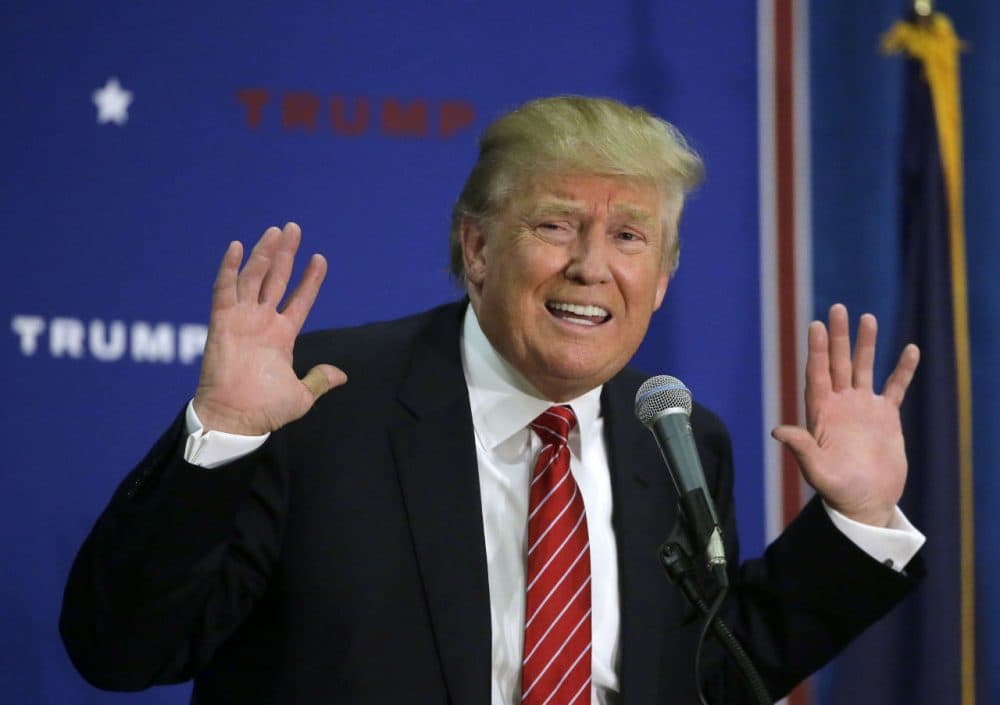Advertisement
Commentary: How The Mighty Trump Might Fall

“Well, I’m not a masochist,” said Donald Trump. That was his answer to a reporter asking if he’d exit the GOP race if he plummeted in the polls.
It’s a question that seems timely now, given that he’s declined from a high of around 30 percent in polls to 23 percent in the latest USA Today survey of likely Republican voters.
No presidential candidate has ever bragged so much about his polling numbers. Indeed, he talks about his popularity as if it were the ultimate argument for why he should be president. In his mind, maybe it’s just a branding strategy: If he keeps selling how popular he is, people might view him as inevitable and hop onto the Trump bandwagon. Or maybe he thinks polls are the equivalent of high ratings for a TV reality show.
His bandwagon slowed to a standstill when he performed poorly in the last televised debate. He worked in insults about rivals, but was put in his place -- as bullies often are -- by opponents who stood up to him. Carly Fiorina, Marco Rubio and others showed they could be just as strong and confident as Trump, but more knowledgeable and persuasive.
Then Trump’s bandwagon started to go backward when he tried to maintain his dominance in the GOP field by getting more specific about issues. He started turning off some Republicans when it became clear that he wasn’t as conservative or populist as they had hoped. He favored ending taxation on the poor. He favored allowing Russia to take over Syria. And he favored universal health care, going far beyond ObamaCare.
At the same time, he indicated that he wanted to project a kinder, gentler image. That seemed like a predictable shift in strategy since polls showed that of all the GOP candidates he had the worst approval/disapproval ratio — negative 25 points.
But he couldn’t suddenly stop insulting opponents who were rising in the polls; they did threaten his frontrunner status. So he veered back and forth between trying to present a new Trump -- talking about his wife and children -- but still acting like the old Trump in retweeting praise about himself, mocking opponents, and whining about “unfair” media coverage.
Trump has proven to be a surprisingly cagey politician, while pretending to be a non-politician. He repeats the same old soundbites, promotes himself tirelessly, flatters supporters, manipulates many in the media, never admits being wrong, and appeals to the resentments of his base.
So if Trump falls in the polls and decides to drop out if the trend seems irreversible, it probably won’t be because of a terrible gaffe or flash of un-presidential temper. He is disciplined enough, and shrewd enough, not to self-destruct that way. And most of his followers seem so loyal to him -- dismissing any criticism with an “I don’t care” response -- that he probably can keep a base of 10-20 percent regardless of any blunder.
The collapse of his support could happen for a different reason: He’s got several rivals who personify different parts of Trump’s appeal.
Fiorina, who has risen in polls from zero to 13 percent, appeals to some Trump supporters who admire a no-nonsense business executive who isn’t afraid to say, “You’re fired.”
Ted Cruz has been cultivating Trump supporters by sounding like a more articulate demagogue on divisive issues like immigration.
Ben Carson is the opposite of Trump personality-wise -- he’s soft-spoken and humble -- but he appeals to Tea Party activists and evangelicals who comprise a big part of Trump’s base.
Rubio isn’t as much of a political outsider as the aforementioned candidates, but with foreign affairs and military policy becoming more important in debate and news coverage, he outshines Trump in making the case that the U.S. must be stronger and more respected in the world.
As these candidates get better known and draw supporters away from Trump, the proud billionaire will be watching the polls carefully for a new reason -- not to bask in the glory of his popularity, but to figure out if and when he should bail out. After all, he doesn’t want to risk being called that most dreaded word in Trump’s vocabulary: loser.
Todd Domke is a Republican political analyst for WBUR.
